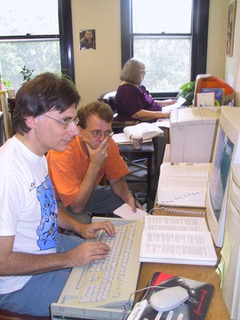Editor’s note: August marked Xpress’ 30-year anniversary. Throughout September we’ll be celebrating the milestone with articles, photo spreads and reflections from current and former staff members. Thank you for reading Xpress, and please consider becoming a member.
Recent arrivals to this city might find it hard to imagine what Asheville was like back on Aug. 10, 1994, when the first issue of Mountain Xpress hit the stands. The city’s population stood at around 67,000, about 30% less less than it is now, and although downtown revitalization had been underway for years, the transformation to today’s bustling, vibrant tourist town still had a long way to go. There was as yet no South Slope, no River Arts District and no high-rise hotels that helped define the downtown skyline. Asheville was only beginning to crop up on “best places to” lists; indeed, persuading anyone to venture downtown at all was still a key concern.
I was the new weekly’s managing editor that day, and for the previous 3 1/2 years I had served as, first, managing editor and, later, editor-in-chief of its predecessor, Green Line. Founded by current Xpress Publisher Jeff Fobes, the scrappy alternative monthly had scraped along for seven years, running mostly on idealism and journalistic fumes in a city that, besides being smaller and less well-known, was much more conservative back then. Advertisers were few and far between, and it wasn’t unheard of for pioneering downtown retailers to offer the paper’s staffers a discount on purchases in lieu of paying for their ads.
Undeterred, Green Line bravely waded into the fray, challenging a political status quo that was accustomed to operating with little transparency and only limited media scrutiny. A cadre of energetic young reporters routinely put in 50-hour workweeks for a few thousand dollars a year with no benefits; I gamely tried to oversee the project while Jeff, the ship’s captain, laid out the guiding philosophy and tirelessly ran around persuading a handful of prosperous true believers to kick in funds to help keep the lights on. It wasn’t a nonprofit but a no-profit whose “investors” had little hope of ever seeing a return on their money, apart from whatever benefit they felt our collective efforts were bringing to the city and its residents.
Rolling with the punches
For me, though, the job seemed ideal, as I was free to take my best stab at practicing hard-hitting, progressive journalism without worrying about which local power brokers or advertisers we might offend. We regularly ran hefty investigative pieces that enabled us to dig into key topics in depth, and during the marathon weekend when an issue was being put to bed, it wasn’t unusual for those stories to be postponed for another month if it was felt that more time was needed to get it right.
Eventually, however, financial reality caught up with us, and faced with a clearly unsustainable model, Fobes asked the assembled staff to vote on whether to pull the plug and simply fade away — or reinvent the paper as a somewhat more mainstream weekly that might have a chance of surviving over the long haul. The vote came in resoundingly in favor of forging ahead, and after another vote to choose a new name, Mountain Xpress rose from the ashes of Green Line like a paper phoenix.
We took most of July off to engineer the big transition, which included both creating a template for the layout and deciding what sort of content we would offer. To that end, a half-dozen of us drove up to Boston for the Association of Alternative Newsweeklies’ annual meeting, where we heard a talk by NPR’s Cokie Roberts and picked the brains of folks representing more established papers like Raleigh/Durham’s Independent Weekly and the Nashville Scene. A few weeks later, we put out our inaugural issue.
“Welcome to Mountain Xpress” proclaimed a boxed message on the letters page. “You are reading a locally owned, independent, investigative newsweekly committed to setting a standard of journalistic excellence in Western North Carolina. We believe that tolerance and respect for diverse views and opinions are essential ingredients for healthy communities. Also essential are media which promote local dialogue, so that the communities they serve learn who they are and who they want to become. … We aim to reach the area’s most active, thoughtful and independent-minded readers.”
Cecil Bothwell, who went on to become managing editor for a time and later served on City Council, wrote the lead story, which explored the local implications of the War on Drugs. The cover image showed a stoned-out cartoon rabbit, eyes bulging. All well and good — but a week later, it was déjà vu all over again, and we were back in the trenches, scrambling to put together the next issue.
Money for nothing

In the early going, it was slim pickings. Advertising revenue was still minimal, and we were thrilled if the paper made it to 30 pages. But there were four or five issues a month instead of one, meaning more opportunities for the advertising staff to work the phones.
Meanwhile, we continued sending reporters to cover the meetings of influential local entities like the Metropolitan Sewerage District, the local air quality board and the water authority, whose deliberations had generally flown under the radar even as their decisions substantially impacted the lives of city and county residents. Under Fobes’ benevolent reign, the fundamental orientation hadn’t changed, though it would be years before the paper broke even financially and the current tagline, “Local Matters,” was adopted.
The paper did extensive coverage of local elections, where each vote carries more weight, even as it typically refrained from writing editorials or endorsing specific candidates. The goal was to give readers meaningful information on which to base their choices and then encourage them to vote — for whichever contenders they deemed best. To that end, we experimented with various approaches, seeking the best way to elicit substantive answers from candidates rather than the ambiguous platitudes that tend to be politicians’ stock-in-trade.
We also continued shining a spotlight on the local arts and entertainment scene, which had been a hallmark of Green Line. And despite the limitations imposed by a staff that was sometimes stretched perilously thin, we periodically ventured beyond Buncombe’s borders to tackle regional and even statewide issues. A key focus was charting the sometimes turbulent doings of the Regional Water Authority. At the same time, we were conscious of the need to at least periodically pay attention to other pressing local concerns such as housing, education and racial issues. Xpress reporters were instrumental in bringing to light the extensive contamination of residential wells in South Asheville and in bringing down Buncombe County Sheriff Bobby Medford. The former CTS property on Mills Gap Road is now an EPA Superfund site, and Medford died in prison in 2020 while serving a 15-year sentence for corruption and extortion. Week by week, a dedicated, ever-changing staff has worked hard to practice grabby but responsible, fact-based local journalism.
The more things change …
It seems only fair, though, to note how my own role has changed over the years. When the decision to switch to a weekly was made, I faced a career choice of sorts, and after some soul-searching, I decided to shift gears and try my hand at freelancing. I did, however, give the paper six months’ notice — long enough to help navigate the transition and put out the first few issues of Xpress. For the next several years, I contributed to various local and regional publications, including a stint as a reporter and editor covering the Southeast’s incipient craft beer scene. At the same time, I continued doing editing, consulting, managing special projects and even occasionally writing for Xpress. Around 2006, I came back on staff for a second stint as part of the editorial staff. But by 2013, my unlikely, peripatetic and somewhat unconventional career path had steered back toward freelance editing, which has kept me involved with the paper while allowing me more leeway to pursue other activities.
Over the years, I’ve watched the paper adapt to dramatically changing conditions, survive the Great Recession of 2008 and creatively evolve in tandem with the growth of its home base. Asheville is a different city now, and Xpress has kept pace with those changes while staying true to its foundational principles. These days, I am semiretired, though in between (and even, sometimes, during) my extensive travels, I still do a limited amount of editing for the paper. That has enabled me to continue practicing a craft I am passionate about while admiring, albeit from afar, the good work that the current crop of staffers and freelancers is carrying out under the Xpress banner each week.
It blows my mind to think that this ambitious, idealistic, sometimes borderline preposterous undertaking has not only survived but has flourished for three decades, and I look forward to seeing what surprises the future holds in store.




Before you comment
The comments section is here to provide a platform for civil dialogue on the issues we face together as a local community. Xpress is committed to offering this platform for all voices, but when the tone of the discussion gets nasty or strays off topic, we believe many people choose not to participate. Xpress editors are determined to moderate comments to ensure a constructive interchange is maintained. All comments judged not to be in keeping with the spirit of civil discourse will be removed and repeat violators will be banned. See here for our terms of service. Thank you for being part of this effort to promote respectful discussion.